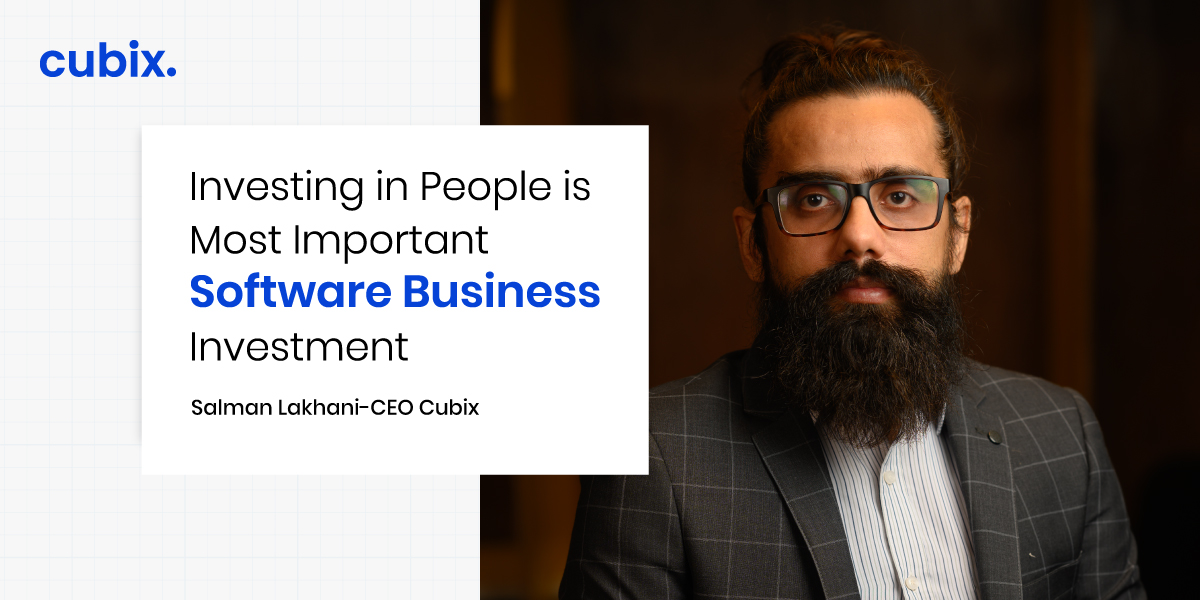My success and strength are my people; they are the ones who have brought Cubix success. Salman Lakhani-CEO Cubix
You must have heard about the entrepreneur who received $2 million after presenting a presentation about nothing; if you haven't heard of this, you must read up on this. That same entrepreneur, Itay Adam, designed a new investment model for investors based on his ideas to secure funding. But, again, he focused on investing in people, not products.
Put Your Investment in "People," not the "Product" - the most productive companies do just that.
"We started small and are growing as a full-stack development company, " says Salman Lakhani, CEO of Cubix, a world-renowned software development company.
He first invested in people to create illustrious products. Two people started this company, and eventually, they formed a core team of 7 highly skilled individuals who paved the way to produce hundreds of products for clients worldwide.
Investing in our people has brought brilliant results for the entire software business. Hence, employees now focus their efforts on designing outstanding products services comprising game development, AI products, and whatnot.
Cubix founder and CEO believes that people are essential for building things. You may have a brilliant idea, but you need people to build it.
Successful Software Business Transformation is all about Investing in Your People
"People can either make the roadmap successful or can create obstacles in it."
A lot depends on how an organization utilizes its human capital. An enthusiastic team can be of tremendous significance as a catalyst for digital development products with leading skill sets.
Commitment to Your Team of People
The Modern Cloud Champions Research demonstrates the proceedings when organizations sustain investment with the end goal entailing employees becoming more aligned with their cloud strategy. This drives their brand growth.
They found that the elite squad made investments and aligned the cloud strategy suitably. This elite group, the Modern Cloud Champions, is now known to average a 60% more effective cloud transformation. This has been demonstrated in the following:
Richard Branson put it best: Customers come second; employees must be placed first. It's a philosophy that brings unexpected benefits to both the company and its clients.
Read More: 9 Rules for Running a Successful Software Development Team
Broaden the Scope of 5 Business Transformation Elements
Talent: Leaders align their teams for anticipated scenarios through investment directed at current employees, particularly those possessing exceptional skillsets. Successful leaders look forward to nurturing their team members' interest by providing regular training and seminars.
Governance: Their employees gain greater empowerment and equip themselves with cutting-edge technology by decentralizing data access.
Leadership: Leaders who foster a growth mindset along with offering strategic paths fare much better than their peers. For example, leaders sometimes ask employees to collaborate better with their colleagues to share their routines.
“Establish a work culture that fosters learning on the go” - Salman Lakhani-CEO Cubix.
Operational Models: By removing segmented IT infrastructure while increasing collaboration across the board, leadership can get their teams to produce digital experiences tailored to customer needs. Therefore, team members will center their attention more on their growth objectives.
Culture: Instilling a culture that promotes experimentation to attain innovation and invention drives successful firms. A culture centered on Test-Iterate-Learn is what works best in the digital world.
Read about future trends in cloud computing redefining the digitized world.
But the question must be bustling in your head: why should you even invest in the employees, specifically? Well, there is not just one answer, so let's dig deep into it to understand.
Importance of Investing in People
Here are the following reasons why software business executives desire to invest in employees more than other resources:
Maximize Productivity
Organizations engage their employees more with high development maintenance as part of company culture. However, many executives have failed to implement this strategy. Employees delighted with their work can improve productivity in the long run, in ways beyond what you can imagine.
Improving productivity means your happy team can bring more to the table, whether it is a full-stack mobile app development company or providing any development service.
Talent Attraction
The majority of people are attracted to an organization because of the good reviews from existing employees. No organization finds the least qualified applicants submitting their resumes. It's a cumulative effect – it becomes easier to recruit more individuals when you attract more high-quality talent.
Enhancing the Bottom Line:
It allows people to show their creativity yields unexpected results that directly affect the entire organization while improving production and revenue.
Reduce Turnover:
According to The Retention report 2021, employees opt for other employment due to shrinking career growth opportunities alongside dissatisfaction cited. Therefore, the importance of investing in people can directly improve your product development and reduce negative trends like high turnover.
Develop Expertise:
Even if your clients love your products and services, it doesn't mean you're a champion in the areas of human resources and marketing, especially in an era of constant new technologies. To narrow the skill gap, you must invest in employees (your people) by making them professionals in their field, using industry experts' software, and providing the knowledge that your team needs.
Read More: How to get investors for your mobile app - the sophisticated guide
The Conundrum: Why Should We Invest in Others? What if They Leave?
People are an organization's most valuable resource. However, stating that "our people are our business" is different from demonstrating that "our people are our business" simply because the words do not match the actions. For example, it's good that most companies still spend more on their IT departments, but neglecting your employees does not sound good in today's workplace.
Conversely, organizations that invest in developing their employees generate more positive outcomes.
Considering your organization, do you think your people to be your greatest strength? If yes, how do you reflect this statement in your actions? For example, when your budget runs out, can you slash the cost of your people's investment?
People Vs. Things
Leaders face challenges when deciding where to make investments and what investments they should cut. The urgency for "things" prompts leaders to respond instinctively, and due to this, they overlook the incredible importance of developing people and investing in them.
There is no doubt about investing in technological things, but these help your team grow your software business. "Things" can't get done without skilled people, and people become skilled when they are trained. Therefore, no one should forget that people grow businesses. We demonstrate that our words mean more than a golden phrase in a novel by investing in our people.
The Idea of Three Minutes Leadership
Leaders have a much greater responsibility to get things done and contribute to an organization's success compared to the people. A leader's role in a company is vital and imperative, but neglecting their team can prove costly.
You must invest time in your people rather than letting deadlines rob you of this. They're the ones who can make or break your brand. Hence, every leader must keep an eye on their people.
Each person is unique, and some may need more attention, while others may be capable of doing things independently. So, devote your attention as much as you can to ‘three minutes leadership’ lesson daily. Doable?
A leader's biggest mistake
Getting a new position or getting promoted is a thrill for us all, but it is a mistake for us all to believe the new role will make us leaders above all else.
As Stephen Covey said, the fancy title doesn't make you a leader.
Leadership is a choice, not a position.
Big titles don't make you a true leader since authentic leadership involves followers' commitment, which you cannot demand, only earn. It is difficult to get someone's commitment, but if you show them that you care about them, it is the easiest one.
Employees who feel valued become their team's best strength and assets. Authentic leadership ensures that their team members are treated like humans with some goals, challenges, and other life circumstances, and they are always willing to lend a hand when their team members need it.
Some people say we don't have to "make" time for the essential things; instead, we need time. If you want to be an ideal leader, you don't have to take, complete, or find the time; you have to invest it with the people to feel "investing the time" in them. However, certain small things and daily actions can make a huge difference within an organization and globally.
Leaders should not merely show power to their people; they should invest three minutes in each individual to give them a correct direction going forward. What if a leader doesn't share their knowledge with their employees despite having familiarity with the industry, experience of years more than the team, and the stories of all the hustle and bustle during their initial days? The next time you say to yourself: "people are our business," ask yourself:
Be honest with yourself because the answer will tell you that you are a mistaken leader or a true leader.
What People Want: Leadership Vs. Management
Leaders do not run companies, don't manage budgets, or manage inventories; the company's owner does that; a leader just leads people. Everyone has their importance in their minds, so you cannot change their mindset. You often hear about micromanagement, but micro-leads? When you lead people well, you succeed.
Read More: What Role Does a Project Manager Fulfill in a Software Development Company?
When Should You Stop Investing in Your People?
Unlike all other investments, all investments do not bring the desired result. An example of this occurs when a leader proves to be perfect for their team and invests in their members, but one of them fails to make progress.
Investing in your people isn't as easy as it might seem; more is at stake. Nevertheless, just as with investments that fail to produce results, you must cut costs.
Leaders make their people proficient as mothers teach their children how to walk by crawling on the floor. It is hard to leave your children behind; similarly, it's hard to say goodbye to your team members. It is difficult for any leader who never fails to support his team and consistently performs at the highest level, but when to stop investing in your team is the big question, but the answer is not so complicated.
Here's what you should do: Invest in Others
When you feel that the person isn't giving you the desired results, you should stop investing in them by limiting the time you spend on them. Using the example above, you can spend 3 minutes on a person and decrease it to the point that it gets the 0-time investment
Leaders cannot sacrifice the time of their entire team for just one person. When it comes to the importance of investing in people, leadership is imperative, it's the only way, and there is no other way. Essentially, a leader does what must be done to benefit the organization and the team.
Now is the time for software businesses to start investing in their employees to participate in the decision-making process and drive their success. Executives can't always have the best solution to every problem, so businesses must invest in others and integrate them into the growth process.
We've witnessed the excellent results of investing in our people. Try it out for yourself.
Kickstart Your Software Project With Cubix
Cubix has been producing practical development strategies with the help of the agile team. As agile methodology has been the proven approach for achieving successful development processes while meeting the customer-business requirements, we put agile first. From working in an organization to working remotely, we offer the excellent opportunity to hire an offshore agile team.
Want to build state-of-the-art software for your company? Our skilled development team warmly welcomes you. Get in Touch.

